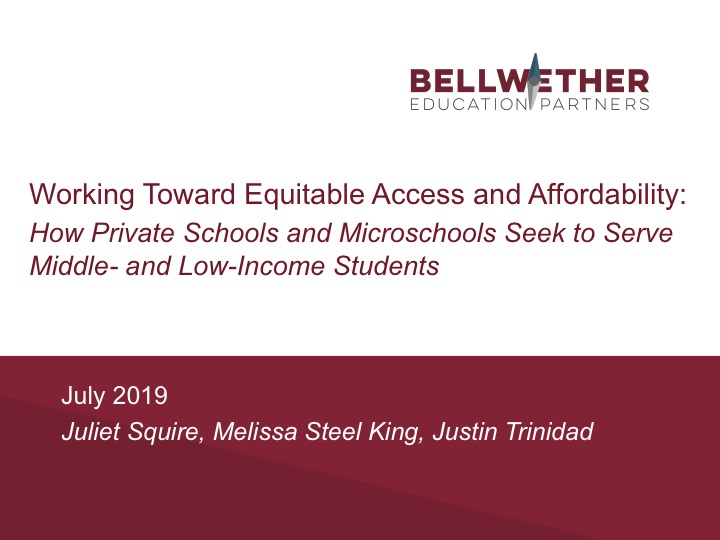Surveys show that 40% of Americans would like to send their children to a private school, yet only 10% actually do so. With an average tuition of $11,450, it’s no surprise that low- and middle-income families are unable to afford private schools.
Many schools try to be more affordable to families by subsidizing costs with public funds, such as vouchers or tax-credit scholarships, or by securing private donations and endowments to provide financial aid. While these revenue sources certainly help, they are limited.

Over the past several years, a number of private schools have come up with alternative and creative ways to fund their schools without passing the buck to parents. In a new report, we’ve profiled schools and networks such as Cristo Rey and Build UP that use work-study models to make private school education more affordable while also providing skills development and asset-building opportunities for students.
Cristo Rey Network
Founded in 1996, the Cristo Rey Network* has provided low-income students with a college preparatory education complemented by their Corporate Work Study Program experience. For five days a month, students complete a full day of work in a corporate environment such as a law firm, bank, or consulting firm, doing anything from general office work to translation services.
Partnerships with local businesses not only provide students with early exposure to important professional development skills, but also significantly subsidize tuition costs. Rather than paying students wages, students’ earnings go directly to the school to supplement tuition. Half of Cristo Rey Schools’ revenue comes from the Corporate Work Study Program, and families only have to pay a small tuition ranging from $1,000 to $2,500 depending on family income. Family contributions make up 10% of Cristo Rey’s revenues, and the remaining 40% comes from fundraising or publicly funded school choice programs.
Build UP
Build UP in Birmingham, AL provides low-income students with a high school and postsecondary education along with job skills and home ownership, while also contributing to the renewal of blighted communities. Over the course of six years, Build UP students earn a high school diploma and an associate’s degree while renovating abandoned homes through paid apprenticeships. Splitting time between coursework in financial literacy, entrepreneurship, and justice-based leadership, students receive an educational stipend of $15 an hour, half of which goes toward their tuition. Families are only obligated to contribute $1,500 in tuition annually.
Graduates take over the deed of an owner-occupied home and a rental property, and can earn passive income as a landlord after they meet one of the following conditions: Begin a high-wage job with a salary of at least $40,000 annually, enroll in a four-year college degree program, or launch their own business. So far, Build UP — which launched in 2018 — has grown to serve 70 students and has plans to expand even more. By gaining workforce skills and a guaranteed pathway to home ownership, Build UP seeks to create a social and economic safety net for the students and communities it serves.
Challenges
While promising, the practicality and scalability of these models pose important questions. How can Cristo Rey and Build UP replicate their models in states without a publicly funded private school choice program? What is the right balance between skills building and academic learning so that one doesn’t interfere with the other? Given the very limited seats available in these schools, how do they handle recruitment and admissions to give a fair chance to students with varying achievement levels and academic backgrounds?
As private schools explore ways to provide access to low- and middle-income families, Cristo Rey and Build UP can serve as encouraging examples. But first, funders and researchers should pay attention to community-centered approaches, the intentional inclusion of students from various socioeconomic and racial backgrounds, and the impact on students’ long-term academic and career trajectories.
Read more in our report, released earlier this week, here.
*Disclosure: Cristo Rey has been a Bellwether client.
August 1, 2019
Affordable Private Schools? There’s a Will — and a Way

Share this article
More from this topic
Education Reformers Using Bad Language: “Return on Investment”
Building a High-Quality Pipeline of Teachers and Leaders: Reflections on Cultivating Talent at Durham Charter School
Bellwether at 15: Forward Thinking. Forward Moving.
No results found.